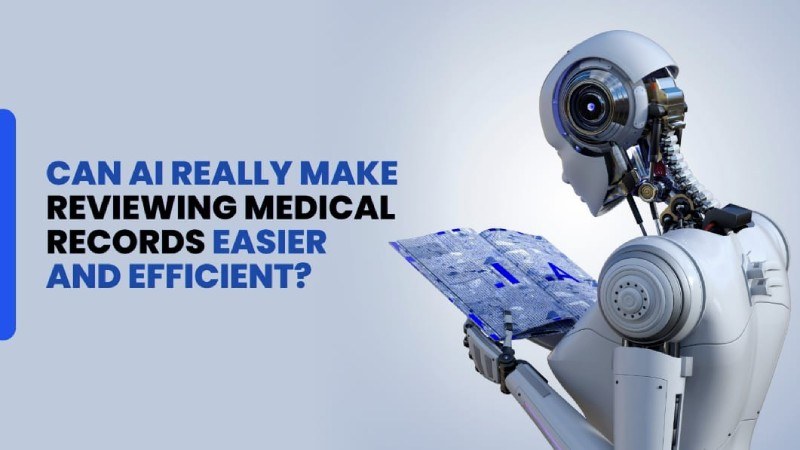
Medical records are the foundation of modern healthcare documentation. These records capture a patient’s entire medical history, from initial symptoms and diagnoses to medications, surgeries, and follow-up care. They serve as crucial tools for healthcare providers, insurers, and legal professionals, who rely on accurate, comprehensive data to make informed-decisions. However, the process of reviewing medical records is often time-consuming, laborious, and prone to errors. Today, Artificial Intelligence (AI) is emerging as a promising solution to streamline this vital medical record review process.
The Impact of AI in Medical Record Reviews
AI technology utilizes Natural Language Processing (NLP) and Machine Learning (ML) algorithms for scanning and interpreting vast dataset with unprecedented speed. It has revolutionized the way the data processing is handled in healthcare. What traditionally required hours or even days of manual review can now be partially or fully automated, allowing reviewers to focus on analysis rather than basic data extraction.
AI systems are efficient at recognizing patterns across documents, identifying key data points, such as diagnoses, treatment timelines, medications, and test results. They also present the precise data in an organized, digestible format. This reduces the intellectual burden on human reviewers, improves efficiency, and enhances consistency across cases.
From complexity to clarity
A typical patient record is a collection of physician notes, lab reports, imaging studies, surgical notes, and discharge summaries. These documents often vary in format, terminology, and quality. AI can standardize and consolidate this information into a clear narrative, providing reviewers with a comprehensive, chronological, and clinically relevant summary.
In legal, medical, and insurance contexts, where medical record review form the base for claims processing, malpractice investigations, and quality assessments, AI reduces the time spent searching for critical facts and cross-referencing records across specialties and facilities.
AI and Human Collaboration: A Complementary Relationship
AI has countless abilities to convert complex data into simple yet comprehensive one. However, AI does not replace the clinical reasoning and contextual understanding provided by experienced professionals. AI tools are effective at processing and organizing data, but they lack the capacity for nuanced interpretation, particularly in cases with complex documentation, rare diagnoses, or complicated multi-specialty care. Thus, the future of medical record review lies not in automation alone, but in AI-powered workflows where human expertise and technology work hand in hand.
Applications of Medical Record Review
Healthcare setting: Physicians and healthcare teams benefit from quicker access to complete patient summaries, enabling more informed decision-making and quality care. Proper audit or review of the quality of care helps them eliminate setbacks and focus more on precise and accurate medical care for the patients.
Insurance sector: Claim adjudication becomes faster and more objective, as AI ensures the documented care aligns with billed services. A thorough and precise medical record review even helps identify insurance fraud and ensures eligible claimants get claim settlements quicker.
Legal field: Attorneys or law firms handling medical malpractice or personal injury cases can quickly identify vital facts, timelines, and potential treatment gaps or inconsistencies. Flawless review reports ensure smooth case preparation and analysis, ensuring strong legal arguments and faster claim resolutions.
Role of Medical Record Review Solutions
Providers offering medical record review services like LezDo TechMed, combines AI technology with human oversight. They use CaseDrive, their AI-driven platform to efficiently scan, categorize and combine complex medical data and provide comprehensive summaries and actionable insights. They utilize technology for most time-consuming tasks while their medical and legal experts handle accuracy and quality audit. This AI combined human approach enables a faster, more reliable medical record review process, tailored to the specific needs of healthcare, legal and insurance sectors.
Ethical and Compliance Considerations
As with any new technology, AI in medical record review raises significant challenges about data privacy, bias, and regulatory compliance. It is important to ensure that AI tools adhere to HIPAA standards and other data privacy laws. Additionally, AI systems must be trained on different types of medical documentation to avoid recurring contextual errors or producing incomplete reports.
In short
The short answer to- Can AI really make reviewing medical records easier and efficient?, is yes, but with some limits. Integration of AI into medical record review process can speed up the work, reduce manual work, and help identify errors. However, it needs human oversight to ensure accuracy and make accurate informed-decisions. If used correctly, AI can be a support, making medical record review faster, easier, and more accurate for everyone involved.